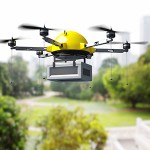FAA Regulation Part 2: Commercial Use of Drones
IN BRIEF
- Proposed regulations for commercial use are still not final
- Commercial use currently requires a 333 Exemption, and a licensed pilot
Commercial Drone Use
As most people now know, the FAA draft regulations have not been finalized even though they were supposed to be in September. At the current time, the FAA’s position is that if a drone is being used for commercial purposes, the operator of the drone must have a pilot’s license and get an exemption. 
The so-called “333 Exemption” that is now being granted regularly by the FAA allows for various commercial uses with conditions attached to the operation of the drones. This exemption process may be used to perform commercial operations in low-risk, controlled environments.
If you receive a Section 333 exemption, you can expect to be required to do the following:
- Have a Certificate of Waiver or Authorization from the Air Traffic Organization
- Have an aircraft registered with the FAA
- Have a pilot with an FAA airman certificate, described below
Under an exemption, the pilot must hold either an airline transport, commercial, private, recreational, or sport pilot certificate. The pilot must also hold a current FAA airman medical certificate or a valid U.S. driver’s license issued by a state, the District of Columbia, Puerto Rico, a territory, or the Federal government.
There will also be restrictions placed on the weight of the drone (under 55 pounds), speed, and altitude. The drone will have to be operated within a visual line of sight of the operator and a visual observer. Conditions will also be placed on the operator to ensure that the drone is well maintained, and that the operation of the drone is completed in a safe manner. Restrictions from being within five miles of an airport will also be in place, absent an agreement with the airport. An example of an exemption can be found here.
What’s Next
The wild card in this process is what the FAA is going to do with the draft regulations. Future installments will discuss the draft regulations and where the FAA may be headed, as well as other issues related to drones.
Seek legal representation on any particular drone related issues you have. For more information, contact one of our Drone Law Team members today.
This issue of Drone Law Boot Camp was authored by Mike Bosse.
